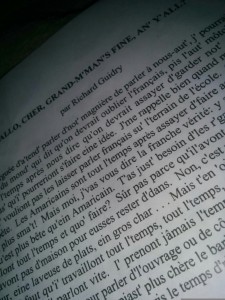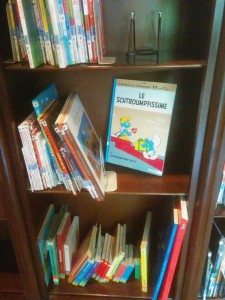If nothing else, Kirby Jambon’s most recent book of poetry has provided me with a number of topics to write about on this blog (like here, here, and here). Today, I’d like to expand more on the idea of the usefulness of providing glossaries to readers who may speak different varieties of the language a work is written in.
Language variety is generally a difficult concept to begin with for those who don’t study linguistics. Usually, we think in terms of languages and dialects, where a language would be something like English or Swahili and a dialect would be something like American English or British English. Relationships between various languages and various dialects of a language are a lot more fluid than that, though.
For instance, Norwegian and Swedish are considered different languages, yet mutual intelligibility between speakers is very high. What’s really happening here is that these two could be considered “dialects” of one Scandinavian language, but, because they’re separated by political borders, they both aim at different standards: “Norwegian” in the former case, “Swedish” in the latter. This phenomenon of dependency is known as heteronomy.
In the case of Louisiana French, not providing a glossary for a literary work that is expected to be read by other francophones implies that one believes their variety to be a part of a larger umbrella language. In general, this sort of heteronomy helps maintain cohesion and mutual intelligibility itself over time, though it also places more value on one variety than the other. If Louisiana French is a dialect of some standard version of the language that speakers aim for, under the assumption that the latter is the “true” language, then it devalues the former.
On the other hand, the inclusion of a glossary suggests that the work in question is written in a variety that is so different that it can be seen as its own separate language, even though others might understand it. This is a position more akin to the reality of the difference between Norwegian and Swedish. The variety certainly maintains its prestige in this scenario, played out in Petites communions, as there’s no way to label it as a sub-par version of a more idealized variety, but one ironically loses any assurance that the two will remain mutually intelligible over time if this idea propagates.
And the idea that Louisiana French is not mutually intelligible with other varieties of French, or that it’s not even French, is quite alive. Many speakers don’t even refer to the language as French at all, but simply as “Cajun,” as in, “I speak Cajun.” Ethnologue, one of the most thorough and popular catalogs of languages of the world, even states that “reportedly, Cajun speakers can partially understand standard French” [my italics], as if to say it’s questionable. As a non-native speaker of Louisiana French myself, I’ve often had experiences where I’ve spoken in French with someone at length, and then, when the subject of French in Louisiana comes up later in the discussion, they claim that they can’t understand a word of it. My usage may not be completely native-like, but it certainly approximates the variety well enough that being able to understand me should equate to being able to understand native speakers, yet it’s as if, in their minds, they imagine Louisiana French as so different that it must not be the language they’re hearing if they’re able to comprehend it.
Ultimately, the choice of a adding a glossary to literary works in Louisiana French has much more political or symbolic meaning than anything else. When Mr. Jambon adds one to his book of poetry, that doesn’t automatically change the fact that the majority of the work is clearly in Louisiana French, it simply lends a little bit more support, inadvertently or not, to the idea that these varieties of French differ from eachother enough that they can be viewed as separate languages. The implications for such a view becoming consensus may need to wait until a later post.


Recent Comments